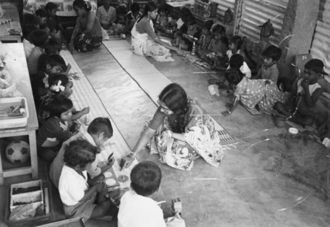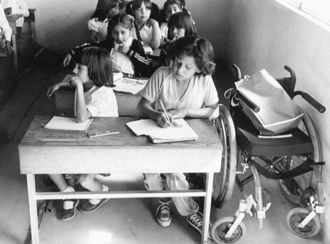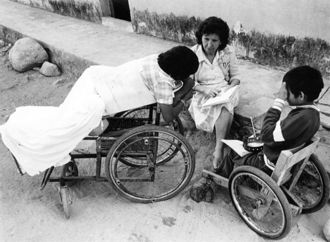Hesperian Health Guides
Which Schools?
HealthWiki > Disabled Village Children > Chapter 53: Education: At Home, at School, at Work > Which Schools?
For children with mild or moderate disabilities this should not be a big problem, if the parents, school director, and teachers cooperate. In some communities, however, and especially in rural areas, parents may not even think of sending their child with disabilities to school. They may fear that their child will be teased or have too hard a time. And in some places, school directors or teachers refuse to accept children with disabilities. Distance and other problems getting to school also add to the difficulties.
Wherever possible, try to overcome these problems. Village rehabilitation workers can talk to teachers, parents and other schoolchildren and try to work out the best situation. At times parents may need to organize and put pressure on the schools to change their policies. In some countries, laws exist requiring government schools to accept and make special provisions for children with disabilities. Rehabilitation workers and parents can find out about the laws, and try to have them enforced. Or they can work to get laws passed if they do not exist.
Every effort should be made to make schooling easier and more enjoyable for children with disabilities. Some possibilities that involve other schoolchildren have already been discussed in Chapter 47 (CHILD-to-child).

For children with more severe disabilities, attending the same schools as other children often may not be possible, at least as schools exist today. Yet, sometimes if you talk with the teachers and other children, they will become more understanding and make special arrangements.
For example, we know a boy with spina bifida who lacks bowel control and therefore never went to school. But after his parents talked with the teacher and schoolchildren, an agreement was reached. Now the boy goes to school. When he has an accident in his pants, he quietly gets up and goes home to bathe and change. (Fortunately his house is very near the school.)
Children with hearing loss can learn well in schools where there are both children with and without hearing loss if the teacher makes an effort to teach all children sign language. But if a child with hearing loss is not taught sign language, it can harm his ability to learn. Sometimes it is best for a child with hearing loss to go to a residential school where he can study with other children with hearing loss and come home to his family on weekends.
In cases where some children with disabilities cannot attend school, other alternatives may be possible. In cities of some countries there are special education programs for children with certain disabilities. Such schools, if private, can be very expensive, and if public, can be overcrowded or have long waiting lists.
In the rural areas, with rare exceptions, there are no special education programs. However, parents of children with disabilities may be able to organize and form their own school. The group helps each child to learn at her own pace and in her own way. An example of such a school is Los Pargos in Mazatlan, Mexico. Also, the Centre for Community Rehabilitation Development in Pakistan has helped organize parent-run special education programs in many towns.
Another option is a study at home program. Children who do go to school can help teach children with severe disabilities at home after school. A community rehabilitation program can also include a study program for children and youth with disabilities. Project PROJIMO has arranged at the local village school for attendance of children with disabilities who have had difficulty in schools elsewhere. In addition, the rehabilitation workers with disabilities assist the children who need tutoring in the evenings.
 |
 |
| |
|
This book does not cover the details and methods of special education. It is important that the methods used be adapted to the local customs and situation—not just borrowed from Europe or the USA, as is often done. An excellent book on Special Education For Mentally Handicapped Pupils, by Christine Miles, has been developed for a program in Pakistan, and has many ideas for adapting to the local culture.


